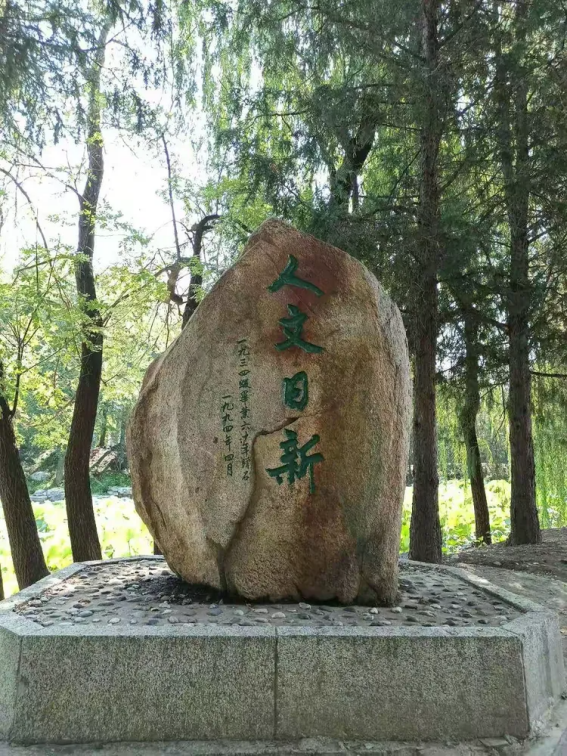编者按:
今天,当我站在这里向大家讲述这些时,我深刻地意识到,在不止一个意义上,我都是中西两种文化的产物,它们在我身上既有和谐,也有冲突。我想说,我为自己的中国传统和背景感到自豪,也同样全心投入现代科学的事业——这一源于西方的人类文明成果。我已经把我的事业奉献给它,以后也会继续奉献。
——杨振宁,1957年诺贝尔奖宴会演讲
新的一周,让我们将目光投向一位以其卓越智慧贯通中西、以其深厚情感连接故土与世界的科学巨匠——杨振宁先生,聆听他在世界学术之巅发出的文化宣言,感受那份植根传统、拥抱世界的胸怀与担当,抵达他思想中最为深沉和坚韧的部分——那份始终不渝的家国情怀。
本周领读:张成萍
一、1957年诺贝尔奖宴会演讲
今天,当我站在这里向大家讲述这些时,我深刻地意识到,在不止一个意义上,我都是中西两种文化的产物,它们在我身上既有和谐,也有冲突。我想说,我为自己的中国传统和背景感到自豪,也同样全心投入现代科学的事业——这一源于西方的人类文明成果。我已经把我的事业奉献给它,以后也会继续奉献。
——杨振宁,1957年诺贝尔奖宴会演讲
英文原文:
As I stand here today and tell you about these, I am heavy with an awareness of the fact that I am in more than one sense a product of both the Chinese and Western cultures, in harmony and in conflict. I should like to say that I am as proud of my Chinese heritage and background as I am devoted to modern science, a part of human civilization of Western origin, to which I have dedicated and I shall continue to dedicate my work.
—Chen Ning Yang, Banquet speech (Dec. 10, 1957). NobelPrize.org.
二、《几位物理学家的故事——在中国科技大学研究生院的演讲》
常常有同学问我,做物理工作成功的要素是些什么。我想,要素可以归纳为三个“P”:Perception,Persistence和Power。
“Perception”——眼光,看准了什么东西要抓住不放。“Persistence”——坚持,看对了要坚持。……“Power”——力量,有了力量,能够闯过关,遇到困难你要闯过去。
如果一个物理学家有眼光,能坚持,而又有很大的力量,那么我想他的成功的可能性就会很大。
——杨振宁,《几位物理学家的故事——在中国科技大学研究生院的演讲》,1986年
英文译文:
Students often ask me what the essential elements are for success in doing physics. I think they can be summarized in three P’s: Perception, Persistence, and Power.
Perception means vision — the ability to see what is important and hold on to it. Persistence means perseverance — once you see what’s right, you must stick to it. …Power means strength — when difficulties arise, you must have the strength to push through them.
If a physicist has perception, persistence, and great power, I believe the chances of success are very high.
—Chen Ning Yang, “Stories of Several Physicists,” speech at the Graduate School, University of Science and Technology of China, 1986. (Translated by the editor.)
三、《Bill Moyers的访问记》
你跳跃,你可能只略知一二,可是你不应该胆怯。这是我来美国之后学到的,特别是从Edward Teller学到的,他是我论文的导师。他的主意层出不穷,可能一天就有十个想法,其中九个半是不对的。可是只要每天你有半个想法是对的,那就当然有很大的收获。而且,他经常大胆讲出自己的初步想法……Teller常常随便抓住一人就说:“看,我有一个聪明的想法。我们要讨论一下。”这给我留下极深的印象,因为它是一个全新的研究方法。
——杨振宁、Bill Moyers,《Bill Moyers的访问记》(1988年),翁帆译
英文译文:
When you take a leap, you may know only a little, but you should not be afraid. This was something I learned after coming to America, especially from Edward Teller, who was my thesis advisor. He was a man with many ideas — perhaps ten bright ideas a day, nine and a half of which were wrong. But if even half an idea was right, that was already a great gain. Furthermore, he's not afraid to talk about them. ...Teller grabs any person and says, “Look, this is a bright idea, and we'll discuss it.” This greatly impressed me. It was a completely new system.
—Bill Moyers and Betty Flowers, A World of Ideas, (1989).
四、《人物》杂志采访
从整个宇宙结构讲起来,人类的生命不是什么重要的事情,个人的生命更是没有什么重要的。不过,从个人讲起来呢,虽然了解了他这个人的生命在整个宇宙之中是一个非常渺小的事情,但并不代表他就不必或者是不应该去想办法做出来他能做的事情,这是我现在的态度。我觉得个人的态度最好是一方面了解到自己的渺小,一方面尽量地希望这个渺小的生命还是有点意义。
——杨振宁,接受刘磊采访,《人物》杂志,2017年6月
英文译文:
From the perspective of the whole structure of the universe, human life is not something important, and an individual life is even less so. However, from a personal point of view, although one understands that his own life is indeed very small in the vast universe, it does not mean that he should not try to do what he can.This is my attitude now. I think the best attitude for a person is to realize, on the one hand, how small he is, and on the other hand, still try his best to make this small life meaningful.
—Chen-Ning Yang, in an interview with Renwu Magazine, conducted by Liu Lei, June 2017. (Translated by the editor.)
五、《近代科学进入中国的回顾与前瞻》
试看一下20世纪的中国:两次大革命、军阀混战、日本入侵、朝鲜战争、灾难性的“文化大革命”,等等,都是大危机。可是这些危机都没有阻止中国在这个世纪科技上的卓越飞跃。为什么?因为做科学工作其实并不困难。必要的条件只是上面所讲的四项,可以概括为才干、纪律、决心与经济支援。中国在这个世纪已经具备了前三项条件,到了下一个世纪将四者具备。
所以我的结论是,到了21世纪中叶,中国极可能成为一个世界级的科技强国。
——杨振宁,《近代科学进入中国的回顾与前瞻》,1993年4月27日在香港大学的演讲,沈良译
英文原文:
Let us look at China in the twentieth century. Two great revolutions, years of warlord turmoil, the Japanese invasion, the Korean War, and the disastrous Cultural Revolution — all were grave crises. Yet none of these crises prevented China from making remarkable advances in science and technology during this century. Why was that possible? Because doing scientific work is, in fact, not so difficult. The essential requirements are only the four I have mentioned: talent, discipline, determination, and economic support. In this century, China already possessed the first three. In the next century, it will have all four.Therefore, my conclusion is that by the middle of the twenty-first century, China is very likely to become a world power in science and technology.
— Chen-Ning Yang, from “Modern Science in China: A Retrospect and a Prospect,” lecture delivered at the University of Hong Kong, April 27, 1993. (As the original English text of this speech is unavailable, this translation is prepared by the editor based on the Chinese version.)
【栏目寄语】
“人文日新”,源自清华百年精神内核,意指人文精神的传承与革新。
“人文日新”栏目,愿以每日晨读为微光,与您共燃思想星火。
“人文日新”不止于晨读,更是对永恒命题的求索。

“人文日新”碑,由清华1934级校友于毕业60周年之际(1994年)敬赠母校,并于校庆83周年纪念日隆重落成。碑上镌刻的“人文日新”四字,正是清华校园文化与精神的核心象征。
1934级堪称清华校史上群星璀璨的一届。这方纪念碑的捐赠者们,有许多如雷贯耳的名字:季羡林、夏鼐、吴晗、翁文波、张宗燧、孙德和、时钧、高振衡、徐芝纶、张青莲、陈省身、张光斗、赵九章、钱学森、顾功叙、张煦……他们以人文之思、科学之光、工程之智,共同诠释了“日新”的真谛——在传承中突破,在坚守中新生。
“人文日新”栏目由清华大学深圳国际研究生院人文社会科学部主办,自2025年9月启动,以每日经典晨读,启迪智慧,滋养心灵。更多精彩内容将每日通过“SIGS艺术与人文”微信公众号发布,欢迎广大读者踊跃投稿。
供稿:人文社会科学部
统筹:张成萍、陈芷洹
责编:吴鸿瑶








